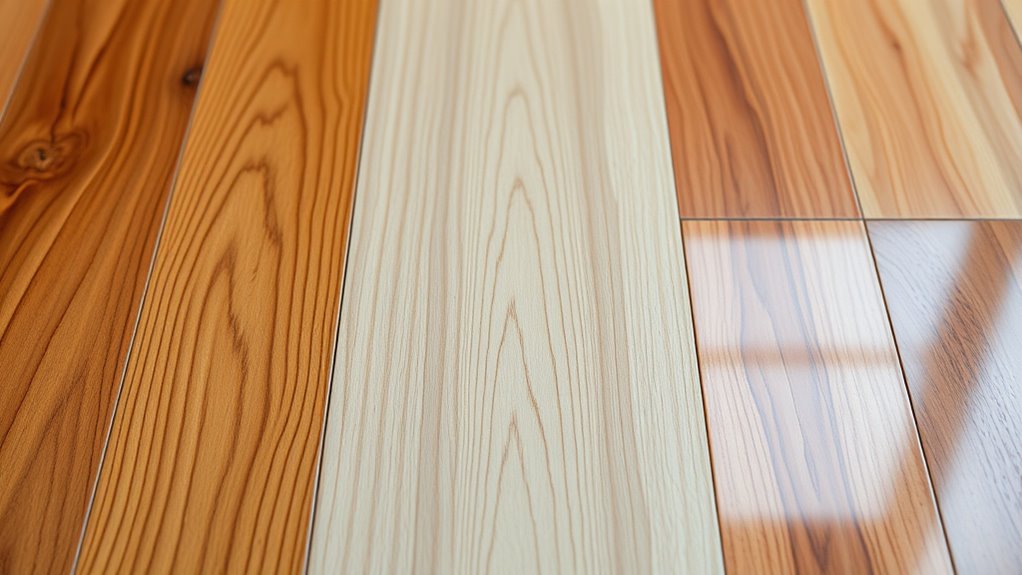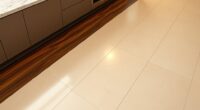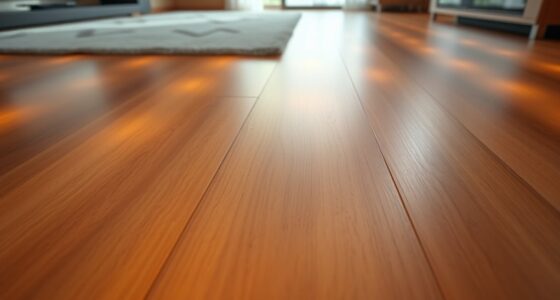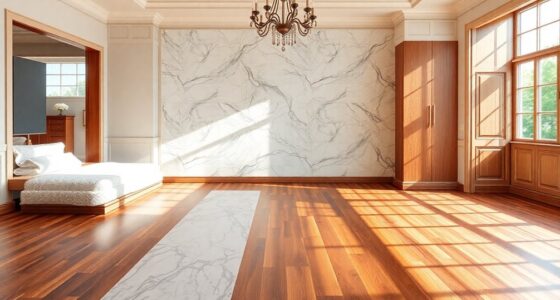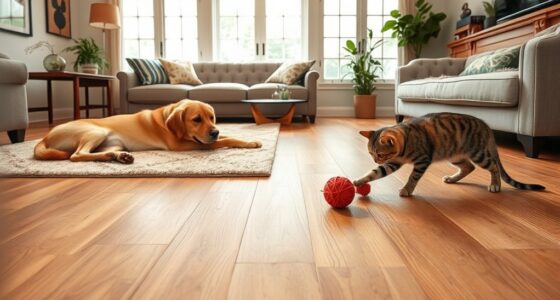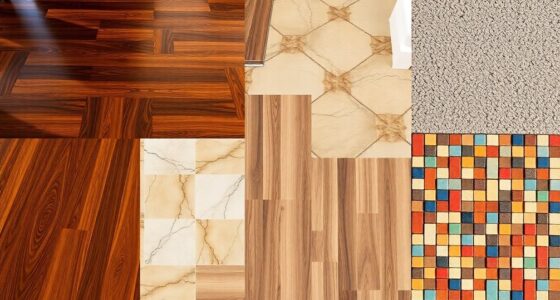When choosing between hardwood, laminate, and vinyl flooring, consider style, cost, and durability. Hardwood offers a timeless, elegant look but needs more maintenance and can be pricier. Laminate mimics wood at a lower cost, is easy to install, and resists scratches, but isn’t as eco-friendly. Vinyl provides water resistance and affordability, making it ideal for moist areas. Each has its benefits and drawbacks, so exploring further will help you decide which suits your space best.
Key Takeaways
- Hardwood offers timeless elegance and can be refinished multiple times, but has higher costs and sensitivity to moisture.
- Laminate provides a budget-friendly, durable, and easy-to-install option, though it has a shorter lifespan and less natural appearance.
- Vinyl is highly resistant to water, scratches, and stains, making it ideal for moisture-prone areas with lower initial costs.
- Hardwood requires regular maintenance and careful environment control to prevent damage, unlike laminate and vinyl which are lower maintenance.
- Laminate and vinyl are quick to install and suitable for DIY projects, while hardwood typically needs professional installation for best results.
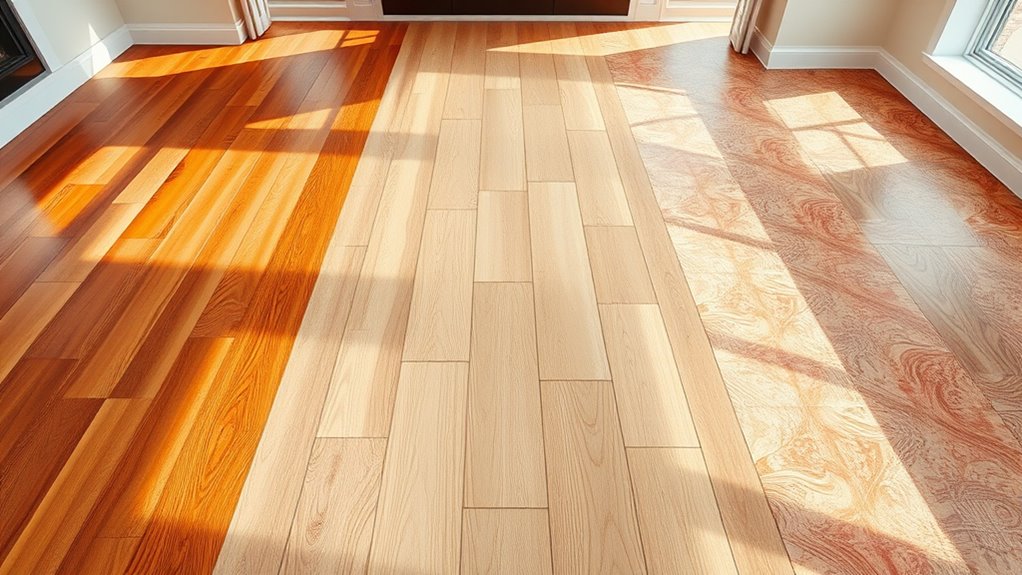
Are you unsure which flooring type best suits your space? Choosing between hardwood, laminate, and vinyl can feel overwhelming, especially when considering factors like installation costs and maintenance requirements. Each option offers unique benefits and drawbacks that can influence your decision based on your lifestyle, budget, and aesthetic preferences.
Hardwood flooring is a classic choice that adds warmth and elegance to any room. When it comes to installation costs, hardwood tends to be more expensive upfront due to the material price and the labor involved in proper installation. It’s a more delicate surface that requires regular maintenance to keep it looking its best. You’ll need to sweep or vacuum frequently to remove dirt and debris, and periodic refinishing helps maintain its shine and durability over years. While hardwood is susceptible to scratches, dents, and moisture damage, many homeowners appreciate its timeless appeal and the ability to sand and refinish it multiple times, extending its lifespan.
Hardwood adds timeless elegance but requires higher upfront costs and regular maintenance.
Laminate flooring offers a more budget-friendly alternative that mimics the look of real wood without the hefty price tag. Its installation costs are generally lower because it features a click-lock system designed for straightforward DIY installation or quick professional setup. Laminate is known for its durability and ease of maintenance. It resists scratches, stains, and fading, making it ideal for high-traffic areas or homes with children and pets. Maintenance mainly involves regular sweeping and occasional damp mopping with a manufacturer-approved cleaner. However, laminate is sensitive to moisture, and excessive water can cause it to swell or warp, so it’s not the best choice for bathrooms or basements prone to dampness.
Vinyl flooring is perhaps the most versatile and cost-effective option, especially for spaces prone to moisture, such as kitchens and bathrooms. Its installation costs are typically lower than both hardwood and laminate, thanks to flexible installation methods like peel-and-stick or click-lock planks. Vinyl is incredibly low-maintenance—just regular sweeping and occasional damp mopping keep it looking fresh. It’s highly resistant to water, stains, and scratches, making it suitable for busy households. While vinyl doesn’t have the same natural look as hardwood, advancements in printing technology have allowed for realistic textures and patterns. The main consideration is that vinyl can be less eco-friendly than natural options and may need replacing sooner, depending on wear and tear.
In the end, weighing the installation costs and maintenance requirements of each flooring type will help you make the best choice for your space, lifestyle, and budget.
Frequently Asked Questions
Which Flooring Type Is Most Eco-Friendly?
When choosing the most eco-friendly flooring, you should consider sustainable materials and eco friendly manufacturing. Bamboo and cork stand out as sustainable options because they grow quickly and require minimal resources. Reclaimed wood is also eco-friendly, repurposing materials and reducing waste. These choices help decrease environmental impact, making them better for the planet. Prioritize flooring that emphasizes eco friendly manufacturing processes and sustainable sources for a greener home.
How Do These Floors Handle Pet Accidents?
Imagine your furry friend’s playful romp ending with a surprise on the floor. Hardwood often stains easily, making pet stain resistance a challenge, and cleaning can be tough. Laminate resists stains better but can swell if moisture seeps in. Vinyl flooring handles pet accidents with ease, thanks to its water-resistant surface, making cleanup simpler. Choose vinyl for pet-friendly flooring that’s durable and easy to maintain after those unexpected pet mishaps.
What Are the Best Maintenance Tips for Each?
You should follow specific cleaning techniques and longevity tips for each flooring type. For hardwood, use a damp mop and avoid excess water to prevent warping. Laminate flooring benefits from gentle sweeping and occasional damp cleaning, while vinyl is best maintained with a soft cloth and mild cleaner. Regular care extends their lifespan, so stay consistent with your cleaning routine, and you’ll keep your floors looking great for years.
Can These Flooring Types Be Installed DIY?
You can definitely try DIY installation for hardwood, laminate, and vinyl flooring if you’re comfortable with tools and following instructions. Many products come with detailed guides or tutorials, making it feasible for a confident DIYer. However, for a flawless finish and to avoid costly mistakes, professional installation might be best, especially for complex layouts or high-end materials. Assess your skills and the project’s scope to decide whether to go DIY or hire a professional.
Which Flooring Options Are Best for High Humidity Areas?
Oh, perfect—you’re choosing flooring for a high humidity area. Irony? Hardwood’s beautiful but, shockingly, not moisture-resistant, making it a poor choice. Laminate offers some resistance but can swell if installed improperly or exposed to excess moisture. Vinyl, however, shines here with excellent moisture resistance and straightforward installation. So, if you want durability without tears, vinyl’s your best bet, even if it’s less glamorous.
Conclusion
Choosing between hardwood, laminate, and vinyl depends on your priorities—durability, style, or budget. Hardwood offers timeless elegance but requires maintenance, laminate provides affordability and scratch resistance, while vinyl combines water resistance with versatility. Consider your lifestyle, aesthetic preferences, and long-term needs to make an informed decision. Weigh the beauty of hardwood, the practicality of laminate, and the resilience of vinyl. Ultimately, your choice should reflect your lifestyle, your style, and your space.
